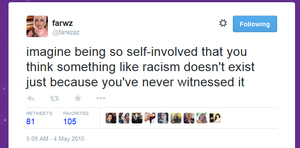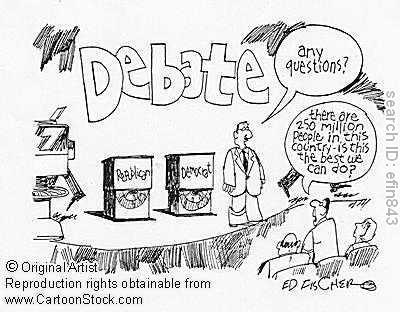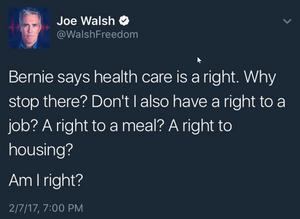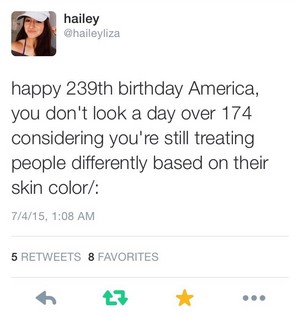There's been a lot of debate in this spot on the general idea of progressive "softies" who need "safe spaces" to avoid being "triggered."
The talk of these kinds of people generally devolves into hyperbolized stereotypes of wimpy college students using it as an excuse not to do their homework, for example. Acronyms like "SJWs" get thrown around, and people express their frustration about feeling like they're walking on egg shells, or censored, or having to cater to other people's over-sensitivity in order to avoid being accused of an "ism" of some sort or another. People feel like they're being attacked for their opinions.
The question invariably becomes: Why do we need so many safe spaces, and why do I feel like my freedom of expression is at risk?
So I'm here to answer those questions in a non-judgmental way, and to explain what these places are and who they help. Hopefully, I'll be able to do this in a way that doesn't offend or frustrate you. You know -- safely.
Allow me to begin by defining a few terms. A safe space is supposed to be places located on the internet and offline (like in colleges and schools) where individuals can go to express and discuss sensitive topics and have a supportive atmosphere. In order to keep these spaces "safe," there are often rules that are enforced as much as they can be by moderators and other facilitators of discussion. Certain views -- for example, hate speech, bigotry, and oppressive commentary -- are strictly not allowed.
An echo chamber is a space where people always agree and repeat the same ideas, providing positive feedback for specific opinions deemed "right" or "truth" to the point that it becomes almost indistinguishable from fact. No one brings up new ideas in echo chambers, or challenges the prevailing opinions.
A trigger is a term that evolved from psychology, specifically in relation to trauma and those who have endured it. A trigger warning, or less controversially a content warning in articles and other media is meant to be a yellow flag for anyone who has experienced trauma that the article or media might discuss. Usually, triggers include sexual assault, violence, drugs, alcohol, or abuse of any sort.
Privilege is something that everyone (for the most part) has in some shape or form. A lot of times, privilege is just seen as something you have or don't have (particularly if you are a white male), but it's far more layered than that.
I could write an entire article on its own about privilege (link), but for the purposes of this article, let's just define it as something you have by luck, genetics, or circumstances, that gives you an advantage over those who don't (whether you are aware of it or not).
In this context, let's focus on the privilege of not having experienced trauma. After all, it's generally these people who criticize trigger warnings and safe spaces.
"Wait, Cinders," I hear someone saying. "I've experienced trauma, and I also think safe spaces and trigger warnings are for pussies."
OK, I hear you. I'm generalizing again, and I'm sorry. But consider your trauma for a second. How did you move through it? Did you have a family to support you? Did you have money for a therapist? Did your insurance cover it? Was the law on your side? Were you able to overcome your trauma and live a mostly normal, and healthy life afterwards?
If you answered yes to any of those questions, you may have had resources available to you that other people did not. And that's privilege.
Just because it isn't a problem for you, doesn't mean it's not a problem for someone else.
It's easy to tell people to just "get over" something, when it's not something we ourselves have personally been through. That's when we need to realize that our experience is not these people's experiences, and they are the expert on their own lives. That's why we have trigger warnings; so that people can make informed decisions about the content they read.
Because trigger warnings are generally related to violence or trauma and not political ideas, they don't contribute to echo chambers, either. Especially as the people using trigger warnings are generally liberals. And they help people to brace themselves for what they are about to read, if they chose to go on.
Remember: You have not experienced their trauma. So give them a break, huh?
Let's get back to safe spaces. If there are rules about the things that are allowed to be said here, how is it not stifling freedom of expression and creating an echo chamber?
What a great question! I love this question because its heart is in the right place, and it wants to promote the exchange of ideas and get rid of echo chambers.
To be clear, echo chambers are not only pointless, they can actually be harmful to progress. Hearing the same ideas over and over again can solidify them into a person's brain until they are unwilling to listen to anything else, or try anything new. Liberals and conservatives alike are guilty of this. Liberals and conservatives create their own echo chambers, and this is one reason that the world is so divided right now into us-versus-them camps.
But Safe Spaces are not echo chambers.
Safe spaces are a place for the marginalized and the victimized. Think of them like mental and emotional rehab. You wouldn't let alcohol into an AA meeting. No emotional abuse is accepted in a meeting for emotional abuse survivors. That's why these rules exist. They are there to promote healing, to build bonds, to build community, and to show people who have been stepped on and ostracized and humiliated that they are not alone, that they have a tribe, and that they are protected.
Safe spaces and trigger warnings aren't for the weak. They're for the survivors. They're for soldiers, fighting battles we never see because they hide them so well. They're for people who were kicked out of their homes by people they thought loved them. People who were betrayed in the most personal way by a stranger, or worse, someone they thought they could trust. People who are yelled at and harassed every day walking down the street just because of their faith, or skin color, or sex. They're for people who are just struggling to get through the next day, who want to talk about the things that are bothering them in a place where they know their feelings and experiences won't be mocked or criticized.
And yet, mocking those survivors is exactly what some people are doing. Whenever I see a comic, or watch a pundit, belittling people who need safe spaces as over sensitive liberals, these are the people I imagine them insulting. Not victims, but veterans, of battles that the people criticizing know nothing about.
Safe spaces do not infringe on freedom of expression, because people who disagree with it are free to express that literally anywhere else. That's why there are so many articles criticizing safe spaces! That's why we can have a conversation! Because, in all honesty, the debate spot and the Internet in general isn't a safe space. It's a war zone for battling opinions and conflicting ideas and progress. And it fights the good fight. But there's a place for safe spaces, too.
Safe spaces are for healing, not debate. They are a respite from the battles these people are fighting. A place to find a tribe.
Safe spaces promote diversity of ideas by allowing people to speak without fear of criticism. There is a time and place for criticism. The internet is rife with forums for it, like this one, where people are allowed to point out flaws in ideas. And I love that the debate spot is one of those places. But sometimes, because of privilege (yup, said that word again), some ideas are stifled.
In the debate spot, at least a few years ago, the liberals outnumbered the conservatives by a heavy amount, and I link this fact at length, fearing this would become another liberal echo chamber. The liberals had the privilege, and the conservatives could barely say anything without getting pounced on by three other users willing to debate their view. How could they even defend themselves?
In safe spaces, we can guarantee diversity of thought because there is diversity of perspective. Barring hate speech doesn't mean barring dissent. And we can hear from marginalized groups who don't normally get a voice. Where do you think the trans rights movement came from; out of thin air? It came from safe spaces.
In short, try not to be so dismissive of safe spaces, trigger warnings, or the people they help. It's not about being overly sensitive, or not being tough. It's about empathy. It's about giving veterans a break from the war, and helping them keep fighting.
It's about being an ally; not an enemy.
The talk of these kinds of people generally devolves into hyperbolized stereotypes of wimpy college students using it as an excuse not to do their homework, for example. Acronyms like "SJWs" get thrown around, and people express their frustration about feeling like they're walking on egg shells, or censored, or having to cater to other people's over-sensitivity in order to avoid being accused of an "ism" of some sort or another. People feel like they're being attacked for their opinions.
The question invariably becomes: Why do we need so many safe spaces, and why do I feel like my freedom of expression is at risk?
So I'm here to answer those questions in a non-judgmental way, and to explain what these places are and who they help. Hopefully, I'll be able to do this in a way that doesn't offend or frustrate you. You know -- safely.
Allow me to begin by defining a few terms. A safe space is supposed to be places located on the internet and offline (like in colleges and schools) where individuals can go to express and discuss sensitive topics and have a supportive atmosphere. In order to keep these spaces "safe," there are often rules that are enforced as much as they can be by moderators and other facilitators of discussion. Certain views -- for example, hate speech, bigotry, and oppressive commentary -- are strictly not allowed.
An echo chamber is a space where people always agree and repeat the same ideas, providing positive feedback for specific opinions deemed "right" or "truth" to the point that it becomes almost indistinguishable from fact. No one brings up new ideas in echo chambers, or challenges the prevailing opinions.
A trigger is a term that evolved from psychology, specifically in relation to trauma and those who have endured it. A trigger warning, or less controversially a content warning in articles and other media is meant to be a yellow flag for anyone who has experienced trauma that the article or media might discuss. Usually, triggers include sexual assault, violence, drugs, alcohol, or abuse of any sort.
Privilege is something that everyone (for the most part) has in some shape or form. A lot of times, privilege is just seen as something you have or don't have (particularly if you are a white male), but it's far more layered than that.
I could write an entire article on its own about privilege (link), but for the purposes of this article, let's just define it as something you have by luck, genetics, or circumstances, that gives you an advantage over those who don't (whether you are aware of it or not).
In this context, let's focus on the privilege of not having experienced trauma. After all, it's generally these people who criticize trigger warnings and safe spaces.
"Wait, Cinders," I hear someone saying. "I've experienced trauma, and I also think safe spaces and trigger warnings are for pussies."
OK, I hear you. I'm generalizing again, and I'm sorry. But consider your trauma for a second. How did you move through it? Did you have a family to support you? Did you have money for a therapist? Did your insurance cover it? Was the law on your side? Were you able to overcome your trauma and live a mostly normal, and healthy life afterwards?
If you answered yes to any of those questions, you may have had resources available to you that other people did not. And that's privilege.
Just because it isn't a problem for you, doesn't mean it's not a problem for someone else.
It's easy to tell people to just "get over" something, when it's not something we ourselves have personally been through. That's when we need to realize that our experience is not these people's experiences, and they are the expert on their own lives. That's why we have trigger warnings; so that people can make informed decisions about the content they read.
Because trigger warnings are generally related to violence or trauma and not political ideas, they don't contribute to echo chambers, either. Especially as the people using trigger warnings are generally liberals. And they help people to brace themselves for what they are about to read, if they chose to go on.
Remember: You have not experienced their trauma. So give them a break, huh?
Let's get back to safe spaces. If there are rules about the things that are allowed to be said here, how is it not stifling freedom of expression and creating an echo chamber?
What a great question! I love this question because its heart is in the right place, and it wants to promote the exchange of ideas and get rid of echo chambers.
To be clear, echo chambers are not only pointless, they can actually be harmful to progress. Hearing the same ideas over and over again can solidify them into a person's brain until they are unwilling to listen to anything else, or try anything new. Liberals and conservatives alike are guilty of this. Liberals and conservatives create their own echo chambers, and this is one reason that the world is so divided right now into us-versus-them camps.
But Safe Spaces are not echo chambers.
Safe spaces are a place for the marginalized and the victimized. Think of them like mental and emotional rehab. You wouldn't let alcohol into an AA meeting. No emotional abuse is accepted in a meeting for emotional abuse survivors. That's why these rules exist. They are there to promote healing, to build bonds, to build community, and to show people who have been stepped on and ostracized and humiliated that they are not alone, that they have a tribe, and that they are protected.
Safe spaces and trigger warnings aren't for the weak. They're for the survivors. They're for soldiers, fighting battles we never see because they hide them so well. They're for people who were kicked out of their homes by people they thought loved them. People who were betrayed in the most personal way by a stranger, or worse, someone they thought they could trust. People who are yelled at and harassed every day walking down the street just because of their faith, or skin color, or sex. They're for people who are just struggling to get through the next day, who want to talk about the things that are bothering them in a place where they know their feelings and experiences won't be mocked or criticized.
And yet, mocking those survivors is exactly what some people are doing. Whenever I see a comic, or watch a pundit, belittling people who need safe spaces as over sensitive liberals, these are the people I imagine them insulting. Not victims, but veterans, of battles that the people criticizing know nothing about.
Safe spaces do not infringe on freedom of expression, because people who disagree with it are free to express that literally anywhere else. That's why there are so many articles criticizing safe spaces! That's why we can have a conversation! Because, in all honesty, the debate spot and the Internet in general isn't a safe space. It's a war zone for battling opinions and conflicting ideas and progress. And it fights the good fight. But there's a place for safe spaces, too.
Safe spaces are for healing, not debate. They are a respite from the battles these people are fighting. A place to find a tribe.
Safe spaces promote diversity of ideas by allowing people to speak without fear of criticism. There is a time and place for criticism. The internet is rife with forums for it, like this one, where people are allowed to point out flaws in ideas. And I love that the debate spot is one of those places. But sometimes, because of privilege (yup, said that word again), some ideas are stifled.
In the debate spot, at least a few years ago, the liberals outnumbered the conservatives by a heavy amount, and I link this fact at length, fearing this would become another liberal echo chamber. The liberals had the privilege, and the conservatives could barely say anything without getting pounced on by three other users willing to debate their view. How could they even defend themselves?
In safe spaces, we can guarantee diversity of thought because there is diversity of perspective. Barring hate speech doesn't mean barring dissent. And we can hear from marginalized groups who don't normally get a voice. Where do you think the trans rights movement came from; out of thin air? It came from safe spaces.
In short, try not to be so dismissive of safe spaces, trigger warnings, or the people they help. It's not about being overly sensitive, or not being tough. It's about empathy. It's about giving veterans a break from the war, and helping them keep fighting.
It's about being an ally; not an enemy.






















